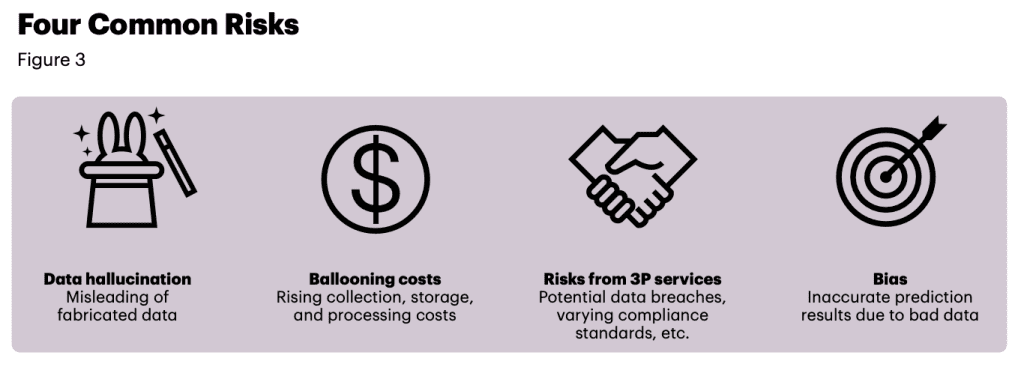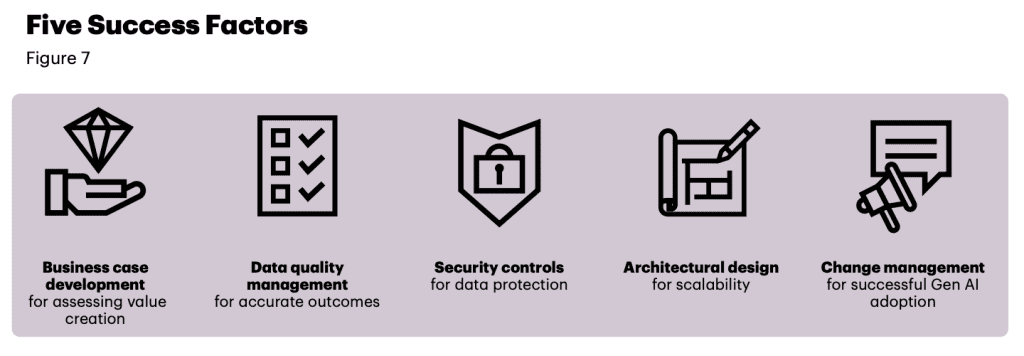March 12, 2024
Sometimes the market can have too much hype – an avalanche of animation that converts insights into white noise. A time when the marketing pendulum swings too far in the rousing direction.
On the topic of artificial intelligence (AI), that is evidently true. This is an ecosystem inundated with identical content – just swap out the vendor name – all carrying the same “change or die” narrative.
While the horse has bolted on that issue, the true test of technology is whether mass excitement converts into mainstream execution. Remember, the market has been here before… blockchain, metaverse, Web3, Internet of Things (IoT) et al.
Early indications suggest AI will avoid a similar fate but nonetheless, what is required to truly move the needle in the enterprise?
“Organisations are likely to change drastically with new AI-enabled technologies – and soon,” observed Burcu Bicakci, Partner at Egon Zehnder.

According to Bicakci – speaking in her additional capacity as AI Lead across Southeast Asia – current market sentiment underscores the “critical role” of leadership in not only comprehending business impact, but steering the organisation accordingly.
“Although the pace of AI adoption has accelerated, it is never too late for leaders to devise a clear AI strategy that can guide their organisation through this transformative phase and keep them ahead of the curve,” Bicakci added.
While most businesses are aligned to the thinking that AI preparedness is no longer optional – albeit the jury is out on the timeline for this – the question now shifts away from the industry to the individual:
To answer this question, Egon Zehnder and Kearney engaged 100 high-profile executives across four countries and six sectors to understand the differences in industry and individual AI preparedness levels.
According to research – Leadership in the Age of AI – 70% of business leaders expect AI to have a disruptive and transformational impact on their organisation within the next five years. To take advantage, executives are investing in infrastructure (49%), building external partnerships (44%) and recruiting expert talent (39%).
But a lack of resources (73%) – chiefly time, money and people – is considered as the biggest inhibitor to AI maximisation in the enterprise. Followed by cultural change (59%) and leadership understanding (51%).

“Given the widespread recognition that AI is going to be a disruptive force for most businesses, it is surprising that business leaders still feel that their organisations are unprepared for the changes to come,” said Alex Liu, Managing Partner and Chairman at Kearney.
“The prevailing sentiment among leaders when it comes to AI is optimism. The challenge now lies in translating this optimism into tangible action, ensuring both leaders and their teams are ready to overcome the challenges and embrace the opportunities that AI provides.”
Assessing the individual impact of AI
Sentiment shifts somewhat when attention turns to individual roles rather than organisational impact. The vast majority of executives (91%) consider AI primarily as a “chance” rather than a “risk” specific to their own position.
Chance in the context of improved:
“Interestingly, leaders believe that AI is going to disrupt their organisation as a whole much more than their own day-to-day roles,” added Mirko Warschun, Partner at Kearney.
“Leaders can use their position to help their teams embrace the change that AI brings and make sure their organisations are benefiting from it, rather than struggling to deal with it. Strong leadership will be vital to achieve this.”
Despite such opportunism, less than half of executives (43%) expect that AI will significantly disrupt their own roles within the next five years.
Such skepticism comes at a time when leaders are already stretched to capacity – managing economic turbulence, geopolitical uncertainty and societal upheaval. As noted by the report, this “poly-crisis” is also against the backdrop of “rising populism and an existential planetary crisis”.
“Organisations and CEOs are not ready for AI as the full-fledged implications are not yet understood,” cautioned Bill Anderson, CEO of Bayer AG. “But leaders will use AI, laggards not. And of course: you always need smart people.”

For executives who expect role-based disruption in the months and years ahead, 40% are confident that they posses the necessary capabilities to navigate the change.
With AI joining the list of rapid changes and challenges people are facing today, Judith Wiese – Chief People and Sustainability Officer (CPSO) at Siemens – is not surprised that most are asking, ‘how do I adapt?’
“Middle management is under pressure,” Wiese noted. “In the past, you were promoted for your knowledge but there’s a new expert in town – AI – and it knows what you know and more. Connecting, engaging and collaborating – people-centric skills – will become even more relevant than ever.”
Echoing Wiese’s observations, Marianne Janik, CEO of Germany at Microsoft – said leaders are “particularly challenged” to deal with the perceived loss of control in their organisation.
“AI is like a new colleague,” Janik explained. “They need to be trained, you have to give them clear work assignments and take your time with them.”
In a note of advise of AI-enthused organisations, Ron Lior – CEO of Uber Freight – recommended that leadership stay as close to the latest technology trends as possible through personal initiatives and projects.
“Do not outsource,” he said. “Continuously invest in several smaller projects to explore new trends. These projects should be supported ‘bottom-up’ to make the team realise these opportunities first-hand.”
Inform your opinion with executive guidance, in-depth analysis and business commentary.